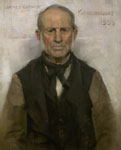
The painting above is entitled “Old Willie – The Village Worthy.” It was painted in 1886 by Sir James Guthrie who was a friend and contemporary of Hornel and the Kirkcudbright Boys. The subject of the painting is known to have lived in Kirkcudbright, but his identity has never been properly established. One school of thought is that he was a gentleman called William Thomson, a cobbler in the town.The following is an excellent short piece about William Thomson.
Kirkcudbrightshire Advertiser, 22 July 1898
William Thomson, of Kirkcudbright : Cobbler and Naturalist.
By cobbling William Thomson exists, but he has not existed only to cobble. Like all disciples of Saint Crispin, ‘Auld Wull’ becomes quite philosophic at times. He thinks much, but speaks little. He is but a working man, as we would hastily summarise him in these times, and to his awl he owes nearly all. He is somewhat striking in appearance, and when arrayed in his apron, with an old soft hat on his head and a pair of ‘specs’ on his nose, he has the appearance of having just sprung from some old world scene of a century ago. Hard work has been his lot in life, yet he has never allowed it to blunt the higher aspirations of an active and superior mind. Possessing a pair of keenly observant eyes, he has used them according to his opportunities wisely and well. Sociable and entertaining in conversation he always is, yet he has never courted many associates. His private life he looks upon as his exclusively to use according to conscience and the dictates of reason. His tastes have lifted him above the sordid and commonplace in human life to the contemplation of the wonderful and beautiful in nature. The wayside flowers and the grasses of the mountains have always been his friends, and by them he has never been deceived. They have been the source of his supremest joys in his happier moments, and his comforters when his arm grew weary and his heart was sad. ‘That’s man’s mad’, I once heard a superior sort of person drawl out as Wull went striding along a meadow in hot chase after a butterfly. But snares and stratagems would dominate society less if it was pervaded by more of such madness. Happily the days are passing when the student of nature – even though he be a crude country cobbler – is called ‘daft’, and well is it for our land that it is so. Yet does it not seem anomalous that most of our flourishing natural history societies should make their home in the teeming cities? Our subject says it is. Those city students seek the country to read from the book of nature, while the dreamy countryman close his eyes and passes it by unopened. Around the grey ruins of a mediaeval castle, or the lines of an ancient fort, William Thomson will linger in pensive mood for the length of a summer day. ‘There is virtue in antiquity’, he will say, if you pull him up to the duties of the present; and his life is impregnated with virtues. Many of the plants and insects which are preserved in the museum of the pretty county town were gifted by William Thomson, and I have before me now some of his home-made floral Christmas cards, which are as harmonious in colour as they are chaste in design. ‘Auld Wull’ drinks nothing stronger than water, yet he has an almost ungovernable antipathy against the pharisaical moralist on teetotalism or religion. This man of many parts was among the first – if not the first – to proclaim to the world the wealth of rock sculpture that lies around Kirkcudbright.
Wull has one great vice – but no cobbler ever had less. He likes a quid of tobacco, and he chews it like a cow. Rebuke him if you will; he will simply reply, with a merry twinkle in his eye, ‘Ye need na’ think ye’ll bend an auld gnarled oak as ye wud a pliant osier twig.’ Nor will he promise to try and mend his ways, though he sorely mourns the leakage o’ the gude juice frae oot his toothless jaws. Three score years and ten he has seen, and nearly all that time he has spent in his native town. His life has not been all a dream of idleness and tranquility – indeed, it has been one long tale of trial, self-sacrificing duty, and uncomplaining suffering. During these latter years his wife Meg and he have been sorely handicapped in the struggles of life by the burden of a sick child. He once told me in confidence that Meg ‘never faulted him except when chowin’ an’ spittin’.’ ‘Eh, man,’ he sighed, ‘if a’ could only spit sae true and faithfu’ as I used tae, and Meg’s grate has tae suffer, and sae hae I!’ Some years ago a few of Wull’s admirers among the Dumfries antiquaries, in conjunction with the parish minister of Kirkcudbright and Mr A.J. Armstrong – who, by the way, has made ‘Wull’ the hero of one of his tales – interested themselves on his behalf, and made him a little gift in recognition of his qualities: but its influence has long since departed, and life gets harder as age creeps on. William Thomson has been truly a hero in humble life, and if the half were known it would be seen how stiff and stern has been the battle he has fought. He fights on still, that he may save, and the odds against him now would overwhelm many a stronger, though less valorous, soldier than this old cobbler of Kirkcudbright.
